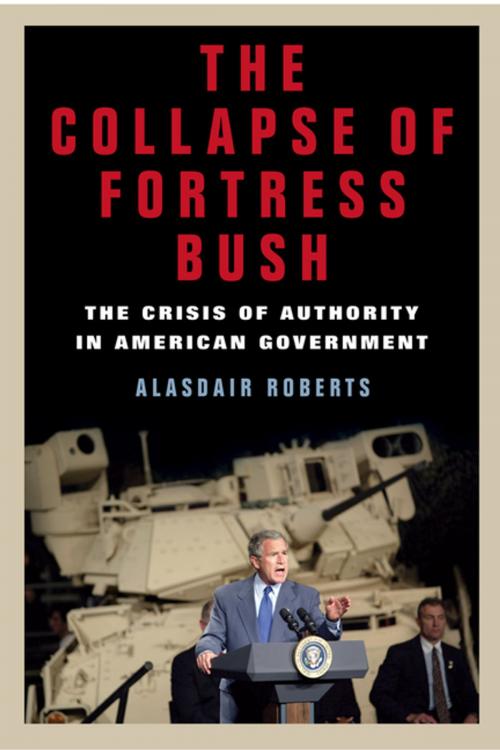The Collapse of Fortress Bush
The Crisis of Authority in American Government
Nonfiction, Social & Cultural Studies, Political Science, Government| Author: | Alasdair Roberts | ISBN: | 9780814776254 |
| Publisher: | NYU Press | Publication: | February 1, 2008 |
| Imprint: | NYU Press | Language: | English |
| Author: | Alasdair Roberts |
| ISBN: | 9780814776254 |
| Publisher: | NYU Press |
| Publication: | February 1, 2008 |
| Imprint: | NYU Press |
| Language: | English |
When the Bush presidency began to collapse, pundits were quick to tell a tale of the “imperial presidency” gone awry, a story of secretive, power-hungry ideologues who guided an arrogant president down the road to ruin. But the inside story of the failures of the Bush administration is both much more complex and alarming, says leading policy analyst Alasdair Roberts. In the most comprehensive, balanced view of the Bush presidency to date, Roberts portrays a surprisingly weak president, hamstrung by bureaucratic, constitutional, cultural and economic barriers and strikingly unable to wield authority even within his own executive branch.
The Collapse of Fortress Bush shows how the president fought-and lost-key battles with the defense and intelligence communities. From Homeland Security to Katrina, Bush could not coordinate agencies to meet domestic threats or disasters. Either the Bush administration refused to exercise authority, was thwarted in the attempt to exercise authority, or wielded authority but could not meet the test of legitimacy needed to enact their goals. Ultimately, the vaunted White House discipline gave way to public recriminations among key advisers. Condemned for secretiveness, the Bush administration became one of the most closely scrutinized presidencies in the modern era.
Roberts links the collapse of the Bush presidency to deeper currents in American politics and culture, especially a new militarism and the supremacy of the Reagan-era consensus on low taxes, limited government, and free markets. Only in this setting was it possible to have a “total war on terrorism” in which taxes were reduced, private consumption was encouraged, and businesses were lightly regulated.
A balanced, incisive account by a skilled observer of U.S. government, The Collapse of Fortress Bush turns the spotlight from the powerful cabal that launched the war in Iraq to tell a much more disturbing story about American power and the failure of executive leadership.
When the Bush presidency began to collapse, pundits were quick to tell a tale of the “imperial presidency” gone awry, a story of secretive, power-hungry ideologues who guided an arrogant president down the road to ruin. But the inside story of the failures of the Bush administration is both much more complex and alarming, says leading policy analyst Alasdair Roberts. In the most comprehensive, balanced view of the Bush presidency to date, Roberts portrays a surprisingly weak president, hamstrung by bureaucratic, constitutional, cultural and economic barriers and strikingly unable to wield authority even within his own executive branch.
The Collapse of Fortress Bush shows how the president fought-and lost-key battles with the defense and intelligence communities. From Homeland Security to Katrina, Bush could not coordinate agencies to meet domestic threats or disasters. Either the Bush administration refused to exercise authority, was thwarted in the attempt to exercise authority, or wielded authority but could not meet the test of legitimacy needed to enact their goals. Ultimately, the vaunted White House discipline gave way to public recriminations among key advisers. Condemned for secretiveness, the Bush administration became one of the most closely scrutinized presidencies in the modern era.
Roberts links the collapse of the Bush presidency to deeper currents in American politics and culture, especially a new militarism and the supremacy of the Reagan-era consensus on low taxes, limited government, and free markets. Only in this setting was it possible to have a “total war on terrorism” in which taxes were reduced, private consumption was encouraged, and businesses were lightly regulated.
A balanced, incisive account by a skilled observer of U.S. government, The Collapse of Fortress Bush turns the spotlight from the powerful cabal that launched the war in Iraq to tell a much more disturbing story about American power and the failure of executive leadership.















